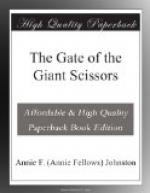Every cap was thrown up, and such cheering rent the air as has never been heard since. They did not know his name, they did not know that he was Prince Ethelried, but they knew by his valor that there was royal blood in his veins. So they all cried out long and loud: “Long live the Prince! Prince Ciseaux!”
Then the King stepped down from his throne and took off his crown to give to the conqueror, but Ethelried put it aside.
“Nay,” he said. “The only kingdom that I crave is the kingdom of a loving heart and a happy fireside. Keep all but the Princess.”
So the Ogre was killed, and the Prince came into his kingdom that was his heart’s desire. He married the Princess, and there was feasting and merrymaking for seventy days and seventy nights, and they all lived happily ever after.
When the feasting was over, and the guests had all gone to their homes, the Prince pulled down the house of the Ogre and built a new one. On every gable he fastened a pair of shining scissors to remind himself that only through unselfish service to others comes the happiness that is highest and best.
Over the great entrance gate he hung the ones that had served him so valiantly, saying, “Only those who belong to the kingdom of loving hearts and happy homes can ever enter here.”
One day the old King, with the brothers of Ethelried (the three that were dark and the three that were fair), came riding up to the portal. They thought to share in Ethelried’s fame and splendor. But the scissors leaped from their place and snapped so angrily in their faces that they turned their horses and fled.
Then the scissors sprang back to their place again to guard the portal of Ethelried, and, to this day, only those who belong to the kingdom of loving hearts may enter the Gate of the Giant Scissors.
CHAPTER III.
Behind the great gate.
That was the tale of the giant scissors as it was told to Joyce in the pleasant fire-lighted room; but behind the great gates the true story went on in a far different way.
Back of the Ciseaux house was a dreary field, growing drearier and browner every moment as the twilight deepened; and across its rough furrows a tired boy was stumbling wearily homeward. He was not more than nine years old, but the careworn expression of his thin white face might have belonged to a little old man of ninety. He was driving two unruly goats towards the house. The chase they led him would have been a laughable sight, had he not looked so small and forlorn plodding along in his clumsy wooden shoes, and a peasant’s blouse of blue cotton, several sizes too large for his thin little body.
The anxious look in his eyes changed to one of fear as he drew nearer the house. At the sound of a gruff voice bellowing at him from the end of the lane, he winced as if he had been struck.




